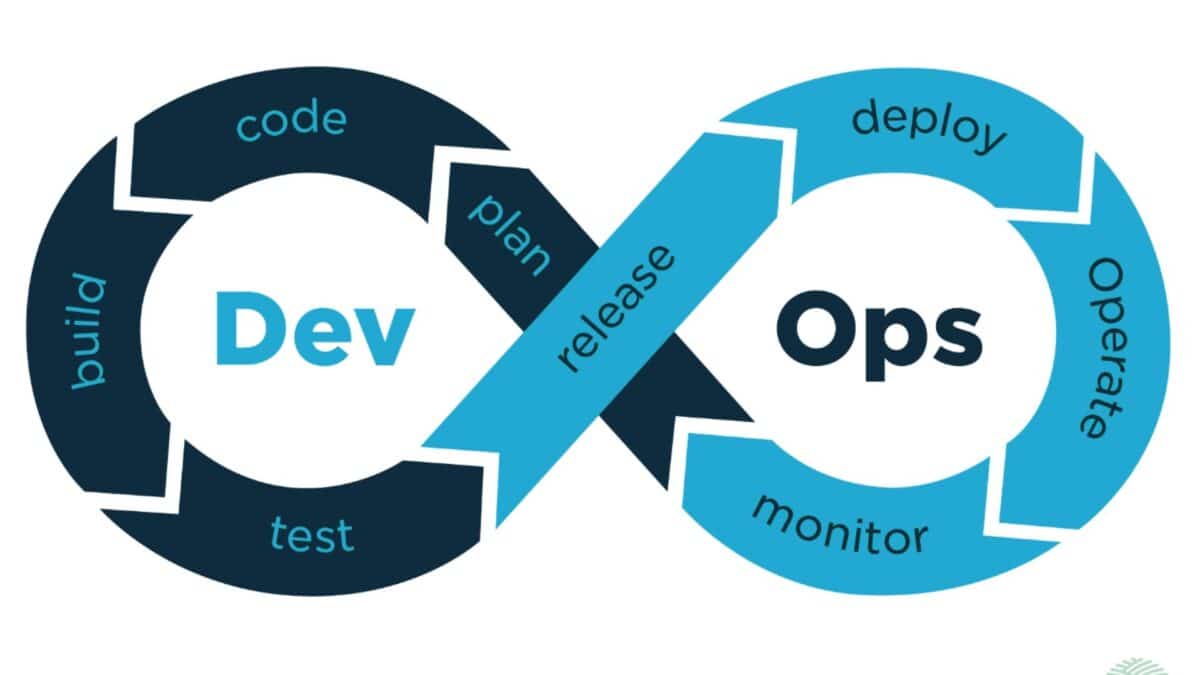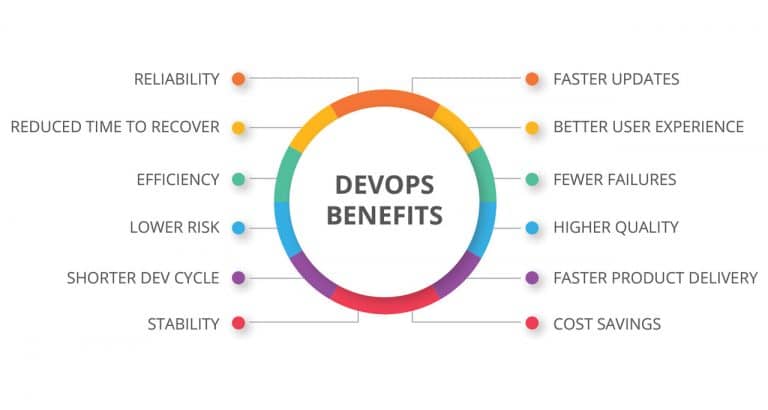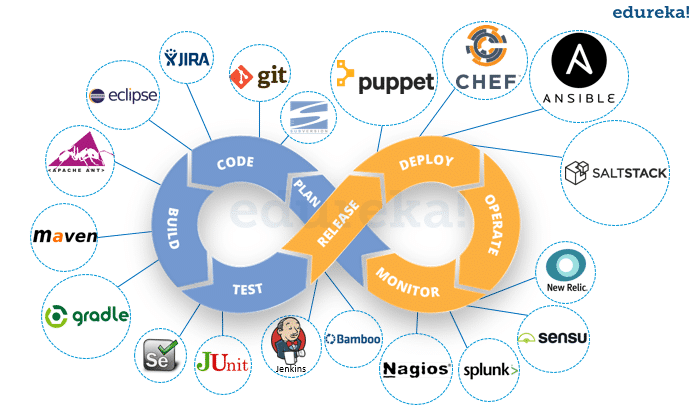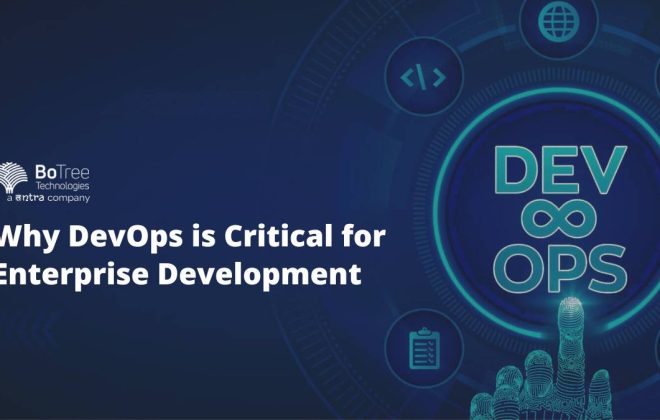
DevOps Trends and DevOps Best Practices
DevOps is a collaborative process of software delivery which brings together the development, operations, and business teams together. DevOps solutions are not software solutions or services provided by software companies. It is a set of practices & ideas that relate to flexible, quick, and efficient development.
DevOps consulting mainly focuses on the rapid scaling of the product and faster development. The development and operations team work together to ensure that they are taking the right approach to development. Since the operations team is closely connected to the market, they have a better understanding of the requirements. Through frequent communication, DevOps engineers ensure that the product in development matches the market requirement.

DevOps has emerged as a practice from agile development methodology. Based on flexibility and better communication DevOps as a service enables developers and engineers to integrate their efforts in harmony and build quick products.
DevOps programming approach offers several benefits as the teams collaborate to deliver a product that works in the market. These benefits include faster development, more time-to-market, improved collaboration, and responsiveness.
One of the primary reasons DevOps consulting is emerging as a popular field is because it enables high-quality software delivery. Since it is based on agile methodology, developers make frequent code changes to the product based on the requirement. It means that code is frequently updated with better versions, which eventually leads to a better product.
DevOps tools and their Implementation
Before we dive deeper into the DevOps trends and best practices, it is crucial to understand what the DevOps tools can do for the teams. They cover a wide range of processes during the software development lifecycle. Each stage has a different set of tools which simplify the development process.
- Atlassian, iRise, Jama Software which focuses on planning and design of the software development lifecycle along with the iterations and product releases.
- ElectricCloud, BitBucket, GitLab, GitHub are the primary DevOps tools used for code management, development, and reviewing the code.
- Delphix, FlawCheck, Parasoft are the notable testing tools which verify the quality of the software in production and prepare it for release.
- Flexagon, Automatic, Clarive are a few release and deployment tools used by DevOps engineers to deploy the code and manage the release.
- Ansible, Chef, Puppet Labs are the primary continuous integration and deployment tools which help in continuous configuration management of the product.

6 DevOps Trends in 2020 you should know
Now that you have gained an understanding of what DevOps services can do for you and the DevOps tools that work best, it is time to understand the DevOps Trends in 2020. DevOps isn’t just a buzzword anymore – it is becoming a necessary practice amongst companies that want to adapt to the rapidly changing business environment. Let’s explore the DevOps trends in detail.
1. DevOps automation
Probably one of the most talked about trends, DevOps automation is a necessity for most enterprises today. Development teams spend a lot of time filling manual forms, creating change requests, and logging in to portals. It is frustrating and eats up a lot of time. Manual processes disrupt the development lifecycle and disrupt essential tasks.
DevOps automation is becoming commonplace as companies move to understand data in a better way and automating manual processes. It will enable developers to focus on app development and result in faster delivery of products.
2. Visibility across processes
DevOps solutions have solved a major problem that existed earlier – visibility across different pipelines in the development lifecycle. Visibility is necessary for analytics and monitoring the performance of the pipelines and activities.
With DevOps programming, companies are now focusing on increasing visibility across the pipelines to drive efficiency in the process. They are exploring the role of AI and ML in serving valuable insights that can reduce the development time and cut short the life cycle. They will make changes based on prior processes and make them visible to ensure that the right approach is taken.
3. Microservices migration
One of the most important DevOps trends is the migration from Monoliths to microservices. Microservices break down the application into smaller components which smoothen the release process. Monoliths take a rigid approach to development and are simple to deploy, but continuous integration is not possible.
Microservies enable DevOps engineers to easily fix bugs by identifying single processes for change. They help enterprises to reduce the complexity in the development process. Microservices are adopted by organizations to reduce the time it takes to market the product. Modifying monoliths disrupt the entire application while microservices are more release-oriented.
4. End-to-end development life cycle
Another major DevOps trend to watch out for in 2020 is the end-to-end development life cycle. Many organizations have different tools for development and operation teams for tackling the small tasks in the product development lifecycle. It makes the process time-consuming, and the approach is spread out everywhere with no one in control.
DevOps as a service enables enterprises to focus on an end-to-end development life cycle. It means that there are tools and platforms which will centralize the operations of the DevOps engineers. Single applications are emerging that streamline the entire development process for the development and operations team.
5. Migration to serverless architecture
Today, DevOps companies are focusing on providing solutions and consulting that enable the use of cloud computing to avoid server management. Serverless architecture is going to be a major DevOps trend in the coming years as companies want to reduce the hassle of managing servers and spend a lot of money.
Cloud providers perform the backend tasks which reduce the administrative costs of managing the servers. It will enable enterprises to deploy applications directly on the cloud. Migration from on-premise servers to the cloud will transform how development teams work today. Cloud computing is a powerful method of deploying applications in real-time.
6. Increase security
One of the most important DevOps trends is cybersecurity. The software development process is highly vulnerable these days. DevOps engineers focus on open workflow and flexible communication, which can lead to major security issues.
DevOps security is a critical issue that is continuously addressed by enterprises. Human errors can’t be controlled and go undetected by monitoring systems. Implementing DevOps solutions security is essential to reduce these errors and eliminate any vulnerabilities that can hurt the development life cycle. With DevOps security, users will get an error-free app without any risk of cyber attacks.
DevOps programming best practices in 2020
Now that you understand the DevOps services are becoming an essential part of a company, you can dive deeper into the best practices. DevOps engineers are always aware of the core principles they must follow to ensure smoother delivery of the product.
DevOps solutions are based on the three core methodologies:-
- Continuous integration
- Continuous delivery
- Continuous deployment
These three methodologies make up for the entire DevOps programming system. But knowing these methodologies is not enough – you must apply them through the best practices for DevOps. Some of the best practices include:-
1. Continuous experimentation
While implementing DevOps as a service, you must not be rigid with your approach. DevOps requires flexibility in the development process. You must continuously experiment and take risks to understand what works best for you.There should be continuous attempts at mastering the DevOps solutions approach you take. You must learn from your successes and failures and modify the approach in a way that best suits your requirements.
2. DevOps centralization
There should be a single DevOps team that is responsible for tools management, implementation of the agile methodology, and operation of different development techniques. By centralizing the DevOps programming functions, you will be able to reduce resource utilization.Implementing DevOps requires a centralized structure to ensure that everyone is one the same page. They must run the training and guidance programs for the team members to integrate their efforts and avoid any miscommunication.
3. Performance monitoring
You can’t just implement DevOps solutions and leave the team to their own accord. In the same way, your DevOps engineers can’t just leave the application once it’s deployed. They must continuously monitor its performance. They must also check the local data centres for the server performance or the cloud host for checking issues in the application.
DevOps monitoring is essential to ensure that all the efforts are in harmony and no team is unnecessarily introducing bottlenecks in the development life cycle. Monitoring enables DevOps engineers to identify the problem and fix them as quickly as possible.
Conclusion: DevOps programming is a cultural change
DevOps solutions are not an isolated, one-time investment – they are a cultural change. DevOps consulting is focused on bringing a positive change in the organization, which can only take place if it is adapted as a culture and not an activity.
DevOps engineers understand the need to collaborate and work in harmony. The development process is becoming flexible day-by-day as the number of stakeholders directly impacted by it increases twofold. DevOps ensures that the teams are working as one unit, and the enterprise is achieving its objective from the development process.
BoTree Technologies has professional DevOps engineers who work with the agile development methodology for flexible application development.
Click here for more details…
At BoTree Technologies, we build enterprise applications with our team of 70+ web development experts.
We also specialize in Ruby on Rails, Python, RPA, AI, ML, Django, JavaScript and ReactJS.




